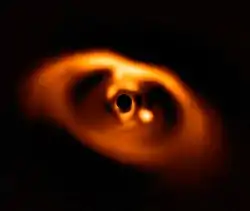Gliese 163 c
Gliese 163 c (/ˈɡliːzə/) or Gl 163 c is a potentially habitable exoplanet,[3][4] orbiting within the habitable zone of M dwarf star Gliese 163.[5]
| Discovery | |
|---|---|
| Discovered by | European HARPS team led by Xavier Bonfils |
| Discovery site | UJF-Grenoble/CNRS-INSU, Institut de Planétologie et d’Astrophysique of Grenoble, France. |
| Discovery date | September 2012 September 20, 2012 (announced) |
| Radial velocity (HARPS) | |
| Orbital characteristics | |
| 0.12536 ± 0.0001 AU (18,754,000 ± 15,000 km) | |
| 25.631 ± 0.0235 d | |
| Star | Gliese 163 |
| Physical characteristics | |
Mean radius | 2.43 [1] R⊕ |
| Mass | 7.3[1] M⊕ |
| Temperature | 277[2] |
The parent star is 15.0 parsecs (approximately 49 light-years, or 465 trillion kilometers) from the Sun, in the constellation Dorado. Gliese 163 c is one of three planets discovered in the system. With a mass at least 7.2 times that of the Earth,[3][4] it is classified as a super-Earth (a planet of roughly 1 to 10 Earth masses).[4][6]
| Earth | Gliese 163 c |
|---|---|
 |
 |
References
- PHL's Exoplanets Catalog - Planetary Habitability Laboratory @ UPR Arecibo
- "HEC: Data of Potential Habitable Worlds". University of Puerto Rico at Arecibo (Planetary Habitability Laboratory). November 12, 2012.
- Méndez, Abel (August 29, 2012). "A Hot Potential Habitable Exoplanet around Gliese 163". University of Puerto Rico at Arecibo (Planetary Habitability Laboratory). Retrieved September 20, 2012.
- Redd, Nola Taylor (September 20, 2012). "Newfound Alien Planet a Top Contender to Host Life". Space.com. Retrieved September 20, 2012.
- Staff (September 20, 2012). "LHS 188 -- High proper-motion Star". Centre de données astronomiques de Strasbourg (Strasbourg astronomical Data Center). Retrieved September 20, 2012.
- "Planet Gl 163 c". Extrasolar Planets Encyclopaedia. Retrieved 2013-03-15.
External links
| Wikimedia Commons has media related to Exoplanets. |
This article is issued from Wikipedia. The text is licensed under Creative Commons - Attribution - Sharealike. Additional terms may apply for the media files.



